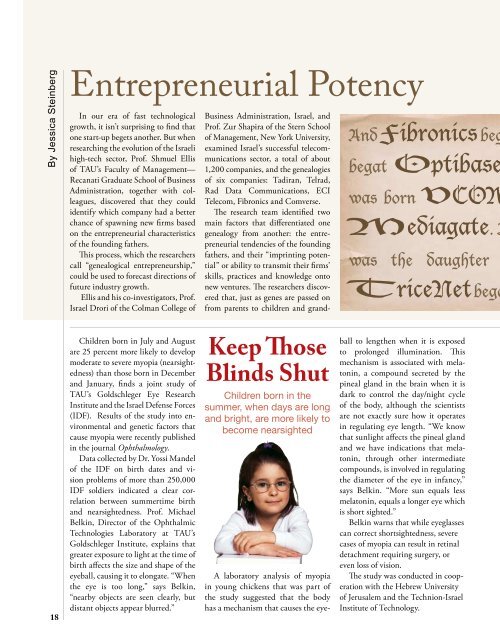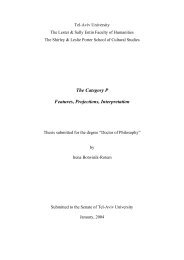Winter 2007/08
Winter 2007/08
Winter 2007/08
Create successful ePaper yourself
Turn your PDF publications into a flip-book with our unique Google optimized e-Paper software.
By Jessica Steinberg<br />
Entrepreneurial Potency<br />
In our era of fast technological<br />
growth, it isn’t surprising to find that<br />
one start-up begets another. But when<br />
researching the evolution of the Israeli<br />
high-tech sector, Prof. Shmuel Ellis<br />
of TAU’s Faculty of Management—<br />
Recanati Graduate School of Business<br />
Administration, together with colleagues,<br />
discovered that they could<br />
identify which company had a better<br />
chance of spawning new firms based<br />
on the entrepreneurial characteristics<br />
of the founding fathers.<br />
This process, which the researchers<br />
call “genealogical entrepreneurship,”<br />
could be used to forecast directions of<br />
future industry growth.<br />
Ellis and his co-investigators, Prof.<br />
Israel Drori of the Colman College of<br />
Business Administration, Israel, and<br />
Prof. Zur Shapira of the Stern School<br />
of Management, New York University,<br />
examined Israel’s successful telecommunications<br />
sector, a total of about<br />
1,200 companies, and the genealogies<br />
of six companies: Tadiran, Telrad,<br />
Rad Data Communications, ECI<br />
Telecom, Fibronics and Comverse.<br />
The research team identified two<br />
main factors that differentiated one<br />
genealogy from another: the entrepreneurial<br />
tendencies of the founding<br />
fathers, and their “imprinting potential”<br />
or ability to transmit their firms’<br />
skills, practices and knowledge onto<br />
new ventures. The researchers discovered<br />
that, just as genes are passed on<br />
from parents to children and grand-<br />
And Fibronics beg<br />
begat Optibase<br />
was born VCOM<br />
Mediagate. A<br />
was the daughter<br />
TriceNet bega<br />
18<br />
Children born in July and August<br />
are 25 percent more likely to develop<br />
moderate to severe myopia (nearsightedness)<br />
than those born in December<br />
and January, finds a joint study of<br />
TAU’s Goldschleger Eye Research<br />
Institute and the Israel Defense Forces<br />
(IDF). Results of the study into environmental<br />
and genetic factors that<br />
cause myopia were recently published<br />
in the journal Ophthalmology.<br />
Data collected by Dr. Yossi Mandel<br />
of the IDF on birth dates and vision<br />
problems of more than 250,000<br />
IDF soldiers indicated a clear correlation<br />
between summertime birth<br />
and nearsightedness. Prof. Michael<br />
Belkin, Director of the Ophthalmic<br />
Technologies Laboratory at TAU’s<br />
Goldschleger Institute, explains that<br />
greater exposure to light at the time of<br />
birth affects the size and shape of the<br />
eyeball, causing it to elongate. “When<br />
the eye is too long,” says Belkin,<br />
“nearby objects are seen clearly, but<br />
distant objects appear blurred.”<br />
Keep Those<br />
Blinds Shut<br />
Children born in the<br />
summer, when days are long<br />
and bright, are more likely to<br />
become nearsighted<br />
A laboratory analysis of myopia<br />
in young chickens that was part of<br />
the study suggested that the body<br />
has a mechanism that causes the eye-<br />
ball to lengthen when it is exposed<br />
to prolonged illumination. This<br />
mechanism is associated with melatonin,<br />
a compound secreted by the<br />
pineal gland in the brain when it is<br />
dark to control the day/night cycle<br />
of the body, although the scientists<br />
are not exactly sure how it operates<br />
in regulating eye length. “We know<br />
that sunlight affects the pineal gland<br />
and we have indications that melatonin,<br />
through other intermediate<br />
compounds, is involved in regulating<br />
the diameter of the eye in infancy,”<br />
says Belkin. “More sun equals less<br />
melatonin, equals a longer eye which<br />
is short sighted.”<br />
Belkin warns that while eyeglasses<br />
can correct shortsightedness, severe<br />
cases of myopia can result in retinal<br />
detachment requiring surgery, or<br />
even loss of vision.<br />
The study was conducted in cooperation<br />
with the Hebrew University<br />
of Jerusalem and the Technion-Israel<br />
Institute of Technology.
















